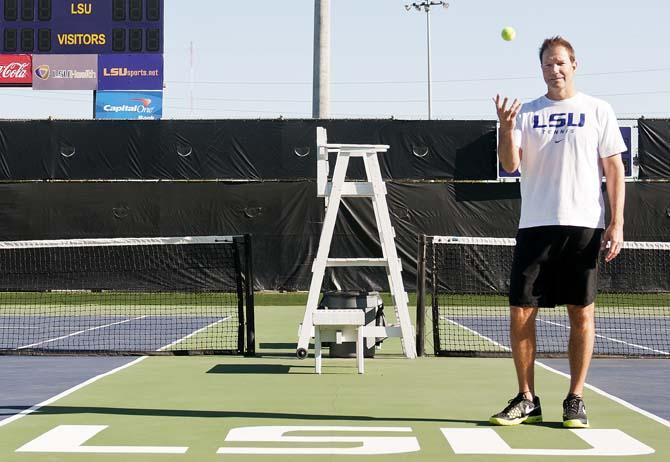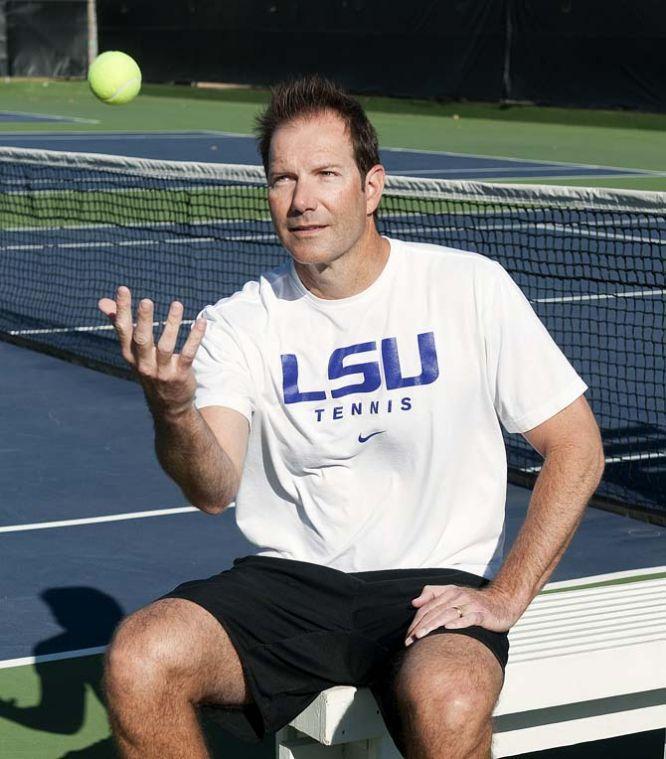When he was handed the reins to the LSU men’s tennis program at only 30 years old, Jeff Brown was concerned he wasn’t ready. Sixteen years later, he is running a program that consistently ranks in the top 25.
After 24 years as a player and coach at LSU, Brown has put his stamp on one of the most consistent teams in the Southeastern Conference by utilizing a controlled approach to an emotional game.
Brown was a part of some of the most successful teams in LSU history under Intercollegiate Tennis Association Hall of Fame coach Jerry Simmons, including the only NCAA Final appearance in Tiger history during his senior season in 1988. He thrived under Simmons’ leadership, but sometimes the emotional swings of a match got the better of him.
“There were times in college when I lost control and my temper got the better of me,” he said. “When it came to matches, I needed to be around [a coach] that was more calm, because I was already so worked up inside.”
After a three-year stint as a professional, Brown returned to Baton Rouge as an assistant coach, and after Simmons retired at the end of the 1997 season, he named Brown the head coach. Brown said he was surprised when Simmons retired at age 52, but happy he would be able to stay at his alma mater.
He now leads the Tigers with the help of one of his former players, current assistant coach Danny Bryan. Bryan said because of the close relationships Brown builds with his players, he cannot remember exactly when he stopped being an athlete and started being a coach.
“It was a very gradual process,” Bryan said. “He brings [upperclassmen] into the coaching side of the game and likes to get their input. … [Working with Brown] wasn’t near as awkward as it would be with a coach who yells a lot and is always putting you down.”
That calm demeanor became an essential part of his coaching philosophy after his playing career, but he knows each player is unique and some may need more prodding than others. His understanding his players’ needs is one of his strongest attributes, said senior Olivier Borsos.
“In our team, there are a lot of different mentalities and personalities, but they are similar to some of his former players,” Borsos said. “So if a player doesn’t have confidence, he knows how to talk to that player. …He makes you comfortable on the court.”
While he is often light-hearted during practice, Brown is all business when it comes to matches. He can be seen quietly standing alongside the courts while the Tigers compete, and he generally apears stoic and detached, but underneath, he is just as stressed as the players, Borsos said.
“There are two [coach] Browns. One during practice and [off the court], when he is smiling and funny and one during matches, when he has his game face on,” Borsos said. “On the court, he is focused just like us.”
Once the match is decided, Brown will greet the other team and shake hands with the players and coaches, even after disappointing losses. Bryan and Borsos agree this illustrates his most admirable trait: his perspective.
“[Coach] Brown is a winner, and he hates losing. But, he knows it is still just a sport, and you cannot go overboard after a loss or celebrate too much after you win,” Borsos said.







